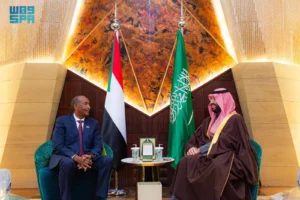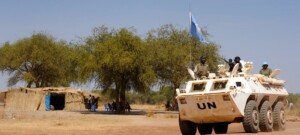Sudan reports 8,889 coronavirus cases, EU provides aid fund
In its latest epidemiological report on Sunday, Sudan’s Federal Ministry of Health announced that the total number of coronavirus cases in the country reached 8,889. On Wednesday, the Ministry of Health, the World Health Organisation (WHO), and the EU signed an agreement of € 11.5 million in support of the joint Covid-19 response programme.
 Yesterday, the second EU Humanitarian Air Bridge flight arrived in Khartoum, facilitated by Sweden, France and the EU’s Civil Protection and Humanitarian Aid Office (eeas.europa.eu)
Yesterday, the second EU Humanitarian Air Bridge flight arrived in Khartoum, facilitated by Sweden, France and the EU’s Civil Protection and Humanitarian Aid Office (eeas.europa.eu)
In its latest epidemiological report on Sunday, Sudan’s Federal Ministry of Health announced that the total number of coronavirus cases in the country reached 8,889. This means an increase of 473 cases in four days. On Wednesday, the Ministry of Health, the World Health Organisation (WHO), and the EU signed an agreement of € 11.5 million in support of the joint Covid-19 response programme.
At least 548 people died of the disease, and 3,699 people recovered in total. Khartoum has recorded by far the most cases: 6,663. El Gezira, bordering Khartoum, reported 801 coronavirus patients, El Gedaref in eastern Sudan 231. The other 15 states have recorded between 172 (Sennar) and five cases (Central Darfur).
However, the actual number of those infected with Covid-19 is higher the those formally reported in the health system, Minister of Health Akram El Tom said in May. “The undermining of the health authorities and the precautionary social distancing measures are the primary reason for the rapid increase of the pandemic in the country.”
On Wednesday, El Tom reported an acute shortage in medicines, especially life-saving medicaments. We need $ 20 million monthly to close the gap, he said.
Aid package
Yesterday, an EU shipment of 11 tons of medical aid items arrived at Khartoum International Airport, accompanied by a medical aid team of 35 people.
This second EU Humanitarian Air Bridge flight includes protective clothing and medical equipment for medical staff and volunteers, in addition to medicines that will go to the Sudanese Red Crescent, the World Health Organisation, Unicef, and other organisations and will be distribute to vulnerable Sudanese, especially displaced people and others affected by the armed conflicts in the country.
The first EU aid flight arrived in Khartoum two weeks ago. It contained 90 tons medical equipment, vaccines, water purifiers, medical kits, medicines, and medical staff protection items.
On Wednesday, the Ministry of Health, the WHO, and the EU delegation currently visiting Sudan, signed a tripartite agreement concerning an EU financial contributions of € 11.5 million in support of the joint Covid-19 response programme.
The EU Humanitarian Aid Office has also signed an agreement with the international NGO Norwegian Refugee Council to help Sudanese vulnerable children to gain access to education, the EU said in a press statement.
Janez Lenarčič, European Commissioner for Crisis Management and Humanitarian Aid, and head of the EU delegation, said after his meeting with Prime Minister Abdallah Hamdok yesterday that the agreement is part of a larger € 120 million aid package.
He said he assured the prime minister of EU support to Sudan for reforms in the economic and social fields in order to achieve peace and development.
Donor conference
Khartoum can fully count on us, he said. This support will be announced as well at the Sudan Partnership Conference in Berlin, co-hosted by Germany, the EU, the UN, and Sudan on Thursday.
The Friends of Sudan group (Canada, France, Egypt, Ethiopia, Germany, Italy, Japan, Kuwait, the Netherlands, Norway, Qatar, Saudi Arabia, Spain, Sweden, the UAE, the UK, the USA, the African Development Bank, the AU, the EU, the League of Arab States, the UN, the International Monetary Fund and the World Bank) will all participate in the video conference today.
In a briefing on Tuesday, the International Crisis Group called on the international donors to finance a cash transfer programme in order to offset price rises following Khartoum’s decision in January to lift fuel subsidies.
“Sudan's transition could easily veer off course without a reinvigoration of the country's economy. Its government should focus on meeting the expectations of a tired and frustrated population, demonstrate that it can deliver benefits to the people and ease the short-term pain caused by overdue economic reforms. But to succeed, the civilian cabinet will require international support to bolster its position within the hybrid transitional government. Donors should come together and back Khartoum’s efforts. Failure to do so could jeopardise the transition, with tragic consequences for the people of Sudan and the region,” the ICG warned.
Radio Dabanga’s editorial independence means that we can continue to provide factual updates about political developments to Sudanese and international actors, educate people about how to avoid outbreaks of infectious diseases, and provide a window to the world for those in all corners of Sudan. Support Radio Dabanga for as little as €2.50, the equivalent of a cup of coffee.












 and then
and then